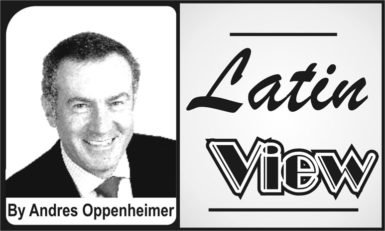 The decision by key South American countries to send an ultimatum to Venezuela’s authoritarian regime demanding that it respect democratic rules went almost unnoticed in the US media, but it may be the region’s most important diplomatic event in recent years.
The decision by key South American countries to send an ultimatum to Venezuela’s authoritarian regime demanding that it respect democratic rules went almost unnoticed in the US media, but it may be the region’s most important diplomatic event in recent years.
The 34-country Organization of American States’ Secretary General Luis Almagro had already issued a report in June stating that Venezuelan President Nicolas Maduro is violating basic democratic principles. But Maduro had claimed that the Almagro report was a personal initiative and a US imperialist scheme, stressing that the United States is a leading member of the OAS.
Now, for the first time, a key group of Latin American countries that does not include the United States has not only demanded that Maduro restore the rule of law, but also issued an ultimatum to do so by December 1 or face Venezuela’s suspension from the trading bloc.
Brazil, the largest country in the region, announced on September 13 that the four founding members of Mercosur — Brazil, Argentina, Paraguay and Uruguay — have decided to oust Venezuela if the country does not meet the Mercosur charter’s trade and human rights commitments by that deadline.
Weeks earlier, Brazil, Paraguay and Argentina had objected to Venezuela assuming the trading bloc’s rotating presidency, but Maduro had unilaterally proclaimed himself Mercosur’s leader anyway, with Uruguay’s blessing. Now, Uruguay’s leftist government has changed sides, joining its fellow Mercosur founding members’ stand.
This was a key diplomatic break with Maduro’s regime after 17 years of near-solid Latin American support — or tolerance — with Venezuela’s abuses on democratic and human rights.
It could hardly come at worse moment for the Maduro government, as it prepared to take over the Movement of Non-Aligned Nations presidency on September 17 amid much fanfare at a ceremony in Venezuela’s Margarita Island.
While the Non-Aligned Movement was important in the 1970s and has largely fallen into oblivion since, Maduro had been trying hard in recent months to portray the event, as well as his country’s planned Mercosur chairmanship, as major diplomatic triumphs.
“The Venezuelan government was trying to use the non-aligned meeting to wrap itself in a mantle of legitimacy and international support, and it was rebuffed by its own South American neighbours,” says Carlos Vecchio, a leading politician of Venezuela’s MUD opposition coalition. “This was a major embarrassment for Maduro.”
To make things worse, by the time the Non-Aligned summit opened its sessions, no international political stars had confirmed their presence. At the time of this writing, only the rulers of Bolivia, Ecuador and Iran had confirmed their attendance.
South American diplomatic sources tell me that Mercosur’s December 1 ultimatum was issued because the region fears a social explosion in Venezuela, and time is running out for a peaceful solution to the country’s political and humanitarian crisis.
The opposition MUD coalition is pressing for a constitutionally sanctioned recall referendum before the end of the year. Under Venezuelan laws, if the referendum is held after the first half of Maduro’s presidency, which is January 10, the current vice president could serve the remainder of Maduro’s term until 2019.
“Time is running out,” a South American diplomat told me. “The Maduro government is dragging its feet and putting all kinds of obstacles to postpone the recall referendum. Mercosur’s members felt they couldn’t wait any longer.”
My opinion: The Mercosur founding members’ ultimatum on Venezuela was very important, but more diplomatic pressure will be needed to press Maduro to allow the referendum this year.
First, Mercosur must go beyond its generic request that Venezuela abide by the group’s democracy clauses, and specifically demand that Venezuela allow the referendum this year.
Second, the Obama administration should publicly end US support for the mediation effort with Venezuela led by former Spanish president Jose Luis Rodriguez Zapatero, and publicly call it for what it is: a farce that is only helping Maduro buy time and postpone the recall vote until next year.
Having said that, the Mercosur declaration may mark a turning point in Venezuela’s recent history of impunity and violation of regional agreements to support the rule of law. It’s about time.
